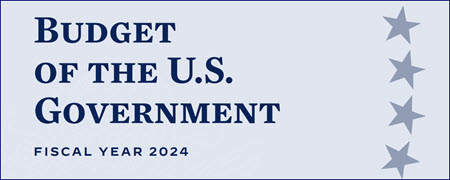Roundtable Weekly
President Biden’s FY2024 Budget Aims to Raise Taxes on Real Estate, Capital Formation, and Investment
March 11, 2023

The Biden administration yesterday proposed a $6.9 trillion
FY2024 budget that includes $3 trillion in deficit reduction and $2.2 trillion in tax increases over the next decade on corporations, high-earning households, and certain business activities, including real estate investment. (
White House budget materials and Treasury Department
news release)
Blueprint for Negotiations
- Real Estate Roundtable President and CEO Jeffrey DeBoer said, “Congress has rejected several of these same tax proposals in the past. In particular, Congress has said no to proposals to double the capital gains rate, tax gains reinvested in property of a like-kind, or taxing unrealized gains. We will strongly urge that these counter-productive proposals again be rejected. They have weak policy support, are poorly timed and quite risky given the current uncertain economy.”
- Of note for real estate:
- Capital Gains Rate
The top, combined tax rate on long-term capital gains would nearly double from 23.8% (20% + 3.8% net investment income tax) to 44.6%. This results from increasing the maximum capital gains rate from 20% to 39.6% and a new proposal to increase the net investment income tax from 3.8% to 5%.
- Mark-to-Market Tax on Unrealized Capital Gains
The FY 2024 budget carries over President Biden's proposal from last year, imposing a retroactive, annual minimum tax of 25% on the income and unrealized gains of taxpayers with wealth (assets minus liabilities) exceeding $100M.
- Real Estate Professionals
The budget also carries over a proposal to extend the 3.8% net investment income tax to real estate professionals and other pass-through business owners who are currently exempt from the tax because they are active in their business.
Tax Proposals
- Other real estate-related tax proposals include:
- Taxing carried interest as ordinary income
- Limiting the deferral of gain from like-kind exchanges
- Increasing the top tax rate on ordinary income to $39.6%
- Ending step-up in basis and taxing unrealized capital gains at death
- Expanding the limitation on excess business losses for non-corporate taxpayers by converting the limitation from a 1-year deferral to a permanent compartmentalization of active pass-through losses
- Modifying tax rules for grantor retained annuity trusts (GRATs) and grantor trusts
- Recapturing and taxing real estate depreciation deductions at ordinary income tax rates
- The budget also devotes $59 billion to provisions aimed at increasing the supply and availability of affordable housing, as well as $10 billion “to incentivize State, local, and regional jurisdictions to make progress in removing barriers to affordable housing developments, such as restrictive zoning.” Tax incentives in the budget include an expansion of the low-income housing tax credit (LIHTC) and a new tax credit for the development of affordable, owner-occupied housing.
These tax issues and other policies affecting CRE will be discussed during The Roundtable’s Spring Meeting on April 24-25 in Washington.
# # #
 The Biden administration yesterday proposed a $6.9 trillion FY2024 budget that includes $3 trillion in deficit reduction and $2.2 trillion in tax increases over the next decade on corporations, high-earning households, and certain business activities, including real estate investment. (White House budget materials and Treasury Department news release)
Blueprint for Negotiations
The Biden administration yesterday proposed a $6.9 trillion FY2024 budget that includes $3 trillion in deficit reduction and $2.2 trillion in tax increases over the next decade on corporations, high-earning households, and certain business activities, including real estate investment. (White House budget materials and Treasury Department news release)
Blueprint for Negotiations
